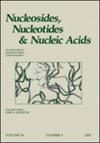Novel mass spectrometry-based assay for thymidylate synthase activity.
IF 1.1
4区 生物学
Q4 BIOCHEMISTRY & MOLECULAR BIOLOGY
引用次数: 0
Abstract
Thymidylate synthase (TS) is an enzyme responsible for the conversion of deoxyuridine monophosphate (dUMP) to deoxythymidine monophosphate (dTMP), with the co-substrate 5,10-methylenetetrahydrofolate (5,10-CH2-THF) as the methyl donor. TS is the only enzyme capable of de novo biosynthesis of dTMP in humans, a nucleotide crucial for DNA synthesis and therefore cell proliferation and survival. As such, TS is a major drug target in chemotherapy by compounds such as 5-fluorouracil. Due to the clinical and physiological importance of TS, the ability to accurately assay its activity is crucial. Several assays have been developed for this purpose, relying on spectrophotometry or radioisotope labeling methods. In this study, we have developed a liquid chromatography - mass spectrometry-based method for assessing TS activity by direct and specific measurement of the reaction product, dTMP. The assay was tested on mouse liver homogenates. We noted that excessive 5,10-CH2-THF concentration (400 µM) led to substrate inhibition and therefore 200 µM was used. The activity assayed at 1 µM dUMP was linear with protein content and time (up to 60 min) and was 0.56 ± 0.12 pmol/mg protein/min, in line with previously reported values. Additionally, by using a high mass resolution Orbitrap instrument side reactions were monitored, revealing major changes in folate pools and nucleotide metabolism. These findings highlight the value of the developed TS assay for routine TS activity monitoring in complex matrixes such as clinical material.基于质谱的新型胸腺嘧啶酸合成酶活性检测方法。
胸苷酸合成酶(TS)是一种负责将单磷酸脱氧尿苷(dUMP)转化为单磷酸脱氧胸苷(dTMP)的酶,辅助底物是作为甲基供体的 5,10-亚甲基四氢叶酸(5,10-CH2-THF)。TS 是人类体内唯一能够从头开始生物合成 dTMP 的酶,而 dTMP 是一种对 DNA 合成至关重要的核苷酸,因此也是细胞增殖和存活的关键。因此,TS 是 5-氟尿嘧啶等化合物化疗的主要药物靶点。由于 TS 在临床和生理上的重要性,准确检测其活性的能力至关重要。为此,已经开发出了几种依赖于分光光度法或放射性同位素标记法的检测方法。在这项研究中,我们开发了一种基于液相色谱-质谱法的方法,通过直接特异性测量反应产物 dTMP 来评估 TS 的活性。该方法在小鼠肝脏匀浆中进行了测试。我们注意到过高的 5,10-CH2-THF 浓度(400 µM)会导致底物抑制,因此使用了 200 µM。在 1 µM dUMP 条件下测定的活性与蛋白质含量和时间(最长 60 分钟)呈线性关系,为 0.56 ± 0.12 pmol/mg 蛋白/分钟,与之前报道的数值一致。此外,通过使用高分辨率 Orbitrap 仪器监测副反应,发现了叶酸池和核苷酸代谢的重大变化。这些发现凸显了所开发的 TS 检测方法在复杂基质(如临床材料)中进行常规 TS 活性监测的价值。
本文章由计算机程序翻译,如有差异,请以英文原文为准。
求助全文
约1分钟内获得全文
求助全文
来源期刊

Nucleosides, Nucleotides & Nucleic Acids
生物-生化与分子生物学
CiteScore
2.60
自引率
7.70%
发文量
91
审稿时长
6 months
期刊介绍:
Nucleosides, Nucleotides & Nucleic Acids publishes research articles, short notices, and concise, critical reviews of related topics that focus on the chemistry and biology of nucleosides, nucleotides, and nucleic acids.
Complete with experimental details, this all-inclusive journal emphasizes the synthesis, biological activities, new and improved synthetic methods, and significant observations related to new compounds.
文献相关原料
| 公司名称 | 产品信息 | 采购帮参考价格 |
|---|
 求助内容:
求助内容: 应助结果提醒方式:
应助结果提醒方式:


